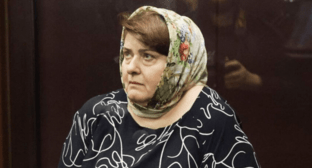31 January 2022, 20:15
Week in the Caucasus: review of main events of January 24-30, 2022
Kadyrov’s struggle with the Yangulbaev brothers and his allegation addressed to Kalyapin and Milashina; acceptance by the Armenian parliament of the resignation of Armen Sarkisyan from the post of president; preparations for the elections in Abkhazia and South Ossetia, – see the review of these and other events in the Caucasus during the week of January 24-30, 2022, prepared by the “Caucasian Knot”.
Kadyrov’s struggle with Yangulbaev brothers and his allegation addressed to Kalyapin and Milashina
Chechen leader Ramzan Kadyrov continued to speak harshly against the Yangulbaev brothers who left Russia and whom he considered connected with an opposition Telegram channel. After the allegation that the Yangulbaev brothers was involved in organizing a terrorist network and beating a Chechen law enforcer in Turkey, Ramzan Kadyrov noted that measures against the Yangulbaev brothers would be taken within the law, but if they resisted, they would be destroyed. Ramzan Kadyrov also said that the Yangulbaev brothers should come to Chechnya for their mother Zarema Musaeva, who was kidnapped and taken to Grozny. Analysts point out that by ostentatious violence against Zarema Musaeva the Chechen authorities provoke her relatives to illegal actions in order to have a reason to punish them.
On January 27, Chechen Ombudsperson Mansur Soltaev posted a report about his visit to Zarema Musaeva kept at a special detention centre. The Ombudsperson emphasized that the woman stayed under medical supervision and provided with medicines. Human rights defenders claimed that an advocate was not allowed to visit Zarema Musaeva. On January 28, Chechen law enforcers announced that Zarema Musaeva had refused the services of an advocate. The human rights defenders and Zarema Musaeva’s son Abubakar Yangulbaev, who worked as a lawyer for the “Committee Against Torture”* in Pyatigorsk, believe that Zarema Musaeva is subjected to pressure.
Ramzan Kadyrov also mentioned as accomplices of terrorists Igor Kalyapin, the head of the “Committee Against Torture”*, and Elena Milashina, a journalist of the newspaper “Novaya Gazeta”. Igor Kalyapin said that he would not complain about the Ramzan Kadyrov’s allegation, because all such allegations voiced by the leader of Chechnya went unpunished. Human rights defender Svetlana Gannushkina and advocate Marina Dubrovina note that the Ramzan Kadyrov’s statement will be unlikely followed by criminal prosecution of Igor Kalyapin and Elena Milashina, but the risk of illegal pressure on them has increased.
Start of campaign to vaccinate teenagers against COVID-19 in Southern Russia amid rising number of infected
Russia has launched a campaign to vaccinate adolescents aged 12 to 17 years against coronavirus. The children will be vaccinated with the consent of their parents, announces the Ministry for Public Health of Kabardino-Balkaria. Adults were subjected to pressure to get vaccinated, and for teenagers, the vaccination campaign will do the same, Instagram users suggest. Furthermore, social media users believe that the planned vaccination of schoolchildren would be ineffective against the spread of the coronavirus infection, since the vaccine does not guarantee complete protection.
Southern Russia takes additional measures because of the worsening epidemiological situation. In the Stavropol Territory, the authorities point to the difficult situation in schools caused by the “omicron” strain. According to the authorities, the transfer to remote work is an inevitable measure. On January 28, restrictions were introduced in the Akhvakhsky District of Dagestan, where traffic between villages was restricted and retail outlets were closed. In Kalmykia, schools and kindergartens have been quarantined since January 24.
Acceptance by Armenian parliament of resignation of Armen Sarkisyan from post of president
On January 24, the National Assembly of Armenia adopted the Armen Sarkisyan’s statement on his resignation from the presidency. He will be temporarily replaced by Alen Simonyan, the chair of the National Assembly. Armen Sarkisyan explained that he had no influence on domestic and foreign policy and became a “target for various political groups.” In 2015, Armenia switched to a parliamentary model of government, and not the president, but the prime minister became the first person in the republic. Armen Sarkisyan was elected president in March 2018. Armenian political analysts argued about the motives for the president’s resignation. Armen Sarkisyan became president in the pre-revolutionary realities, and his relationship with the government has always been difficult, Alexander Iskandaryan believes. Russia might influence the Armen Sarkisyan’s resignation, Naira Airumyan says.
Preparations for elections in Abkhazia and South Ossetia
In Abkhazia, the process of nominating candidates for parliamentary deputies is underway, and elections are scheduled for March 12. By January 30, the number of initiative groups of citizens who nominated their candidates increased to 92, while the number of parties grew to five. The election battle will be fierce because of disagreements between the opposition and the authorities over energy, real estate issues, and arguments over the need for an NGO law, Abkhaz analysts suggest. However, they believe the voter turnout is expected to be low, as people are tired of politics.
The pre-election campaign is also taking place in South Ossetia, where presidential elections will be held on April 10. On January 27, the Central Election Commission (CEC) reported that four contenders for the presidency of South Ossetia had notified of meetings of their initiative support groups. So far, there are no clear favourites among the candidates who would be so authoritative as to count on an easy victory, state analysts.
* The “Committee Against Torture” (CaT) was included by the Ministry of Justice (MoJ) of Russia in the register of NCOs-foreign agents in 2015. In this regard, leaders liquidated the organization and created a new legal entity: the “Committee for the Prevention of Torture”, which was also included in the list of foreign agents, and the organization was closed. At present, the “Committee Against Torture” operates as an unregistered public association.
This article was originally published on the Russian page of 24/7 Internet agency ‘Caucasian Knot’ on January 31, 2022 at 10:20 pm MSK. To access the full text of the article, click here.




